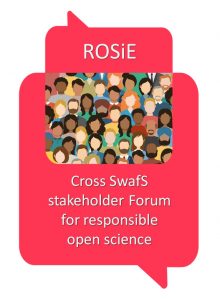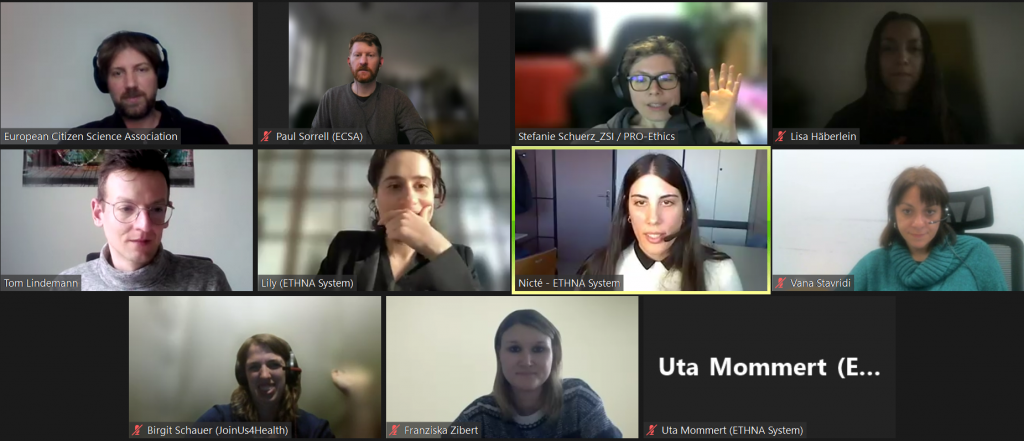8th Cross-SwafS Stakeholder Forum meeting – Difficulties in the implementation of an ethical governance system
The 8th Cross-SwafS Stakeholder Forum began with a welcome and introduction by François Jost of the European Citizen Science Association (ECSA). Following the introduction, each project provided updates on its recent activities and outputs.

ETHNA System representatives Nicté García-Soria and Lily Teitelbaum gave a presentation on the difficulties in the implementation of ethical governance systems. Nicté reported on the results of the ETHNA Legacy workshops which gathered feedback from ETHNA System implementers and internal stakeholders. The workshops were designed to create common space to reflect on experiences with the ETHNA System and pursue dialogue, interactions and qualitative input from respondents.

Information gathered from implementing partners and internal stakeholders through the workshops focused on two areas: challenges and recommendations.
Implementing partners, who were defined as lab managers and responsible research and innovation (RRI) officers, identified challenges to implementing the ETHNA System as: senior researchers being resistant to change; difficulty adapting ETHNA system to existing structures; and the methodology of the system as too rigid. They recommended adapting the implementation method to be co-created through a bottom-up approach; building more flexibility into the implementation method; targeting specific research performing organisations (RPOs); providing regular training for young researchers and new employees; and dedicating staff to execute and monitor the program.
Internal stakeholders identified challenges as: senior management resistance; junior researcher resistance; and a lack of awareness of the ethical codes and documents. They recommended: training sessions or workshops to address and communicate key RRI areas; training for young researchers on RRI; and annual training for staff to ensure execution of ethical codes
After the presentation concluded, two questions were given to the session participants in order to gain their perspectives on fostering change in research culture:
- In your experience, what are the barriers that stand in the way of efforts to change the research culture?
- What are your Dos and Don'ts when trying to affect organisational culture changes?
The Cross-SwafS participants provided the following feedback to the questions:
- In your experience, what are the barriers that stand in the way of efforts to change the research culture?
Resistance to change; lack of understanding; workload; senior leadership support; funding; lack of time; established mentality; lack of acknowledgement; lack of knowledge on RRI; lack of institutional vision; inflexibility; lack of culture of change; publish or perish; other priorities; institutional structures; existing power structures; education/training; economic/quantitative KPI; crisis of reproducibility; "elite science"; insecurities of how to; incentive.
- What are your Dos and Don'ts when trying to affect organisational culture changes?
Do:
- be clear and consistent in your message
- involve stakeholders in the process
- focus on creating a positive environment
- make sure your actions align with your words
- use incentives and rewards to motivate participation
- make sure to measure and track progress
- celebrate successes.
Don’t:
- just rely on top-down directives
- ignore feedback from employees
- make unrealistic promises or commitments
- make sudden or drastic changes
- forget to recognize individuals for their contributions
- isolate yourself from the process
- be afraid to ask for help.